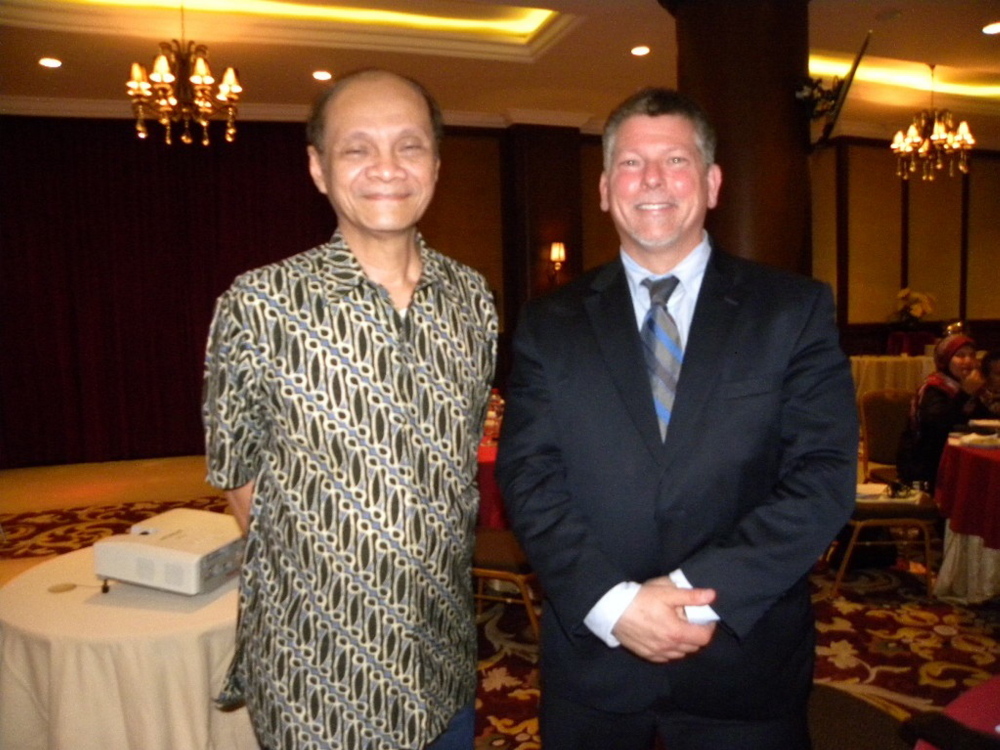In a remote fishing village in Indonesia, many young men eke out a living by raising fish in holding pools and selling them.
Similarly, many of rural Maine’s young people are trying to carve out their own living by growing vegetables or raising small numbers of livestock.
Both groups face a similar problem, which can be solved in a similar way, according to Richard Hopper, who recently took a break from his duties as president of Fairfield’s Kennebec Valley Community College to give Indonesian officials advice on how to help their citizens become more productive.
The answer both home and abroad, Hopper says, is education — specifically, a community college, or “akademi komunitas” in the local language, Bahasa Indonesia.
Both the Indonesian fish farmer and the Maine vegetable grower would benefit from scaling up — producing more of their product and selling it at a profit.
But growing a small business involves a host of logistical issues — money management, finding the best outlet for the product and making sure that diseases don’t suddenly wipe out a year’s worth of work.
Often, a community college is a person’s best chance to gain the skills and knowledge needed to solve those kinds of problems.
Hopper said government has a vested interest in boosting community-level colleges because they play a vital role in stimulating the economy. In some places, including Maine, transforming unskilled workers into skilled workers helps to offset a demographic decline.
“We are shrinking and Maine is getting older,” he said. “We can grow despite this by focusing on our people and our human capital and making them more productive.”
AN EXOTIC PROBLEM
Hopper, a Fulbright scholar, said that since he left a 13-year career as an education specialist with the World Bank to come to KVCC two years ago, he has gained valuable insight into the obstacles that can stand between a rural populace and prosperity.
Those insights are in great demand in Indonesia, where the government is in the early stages of an initiative to establish 57 community colleges throughout the country.
Hopper traveled to Indonesia in June to participate in the conference, a “national discussion” about the initiative held in Surabaya, Indonesia’s second-largest city, with a population of more than 3 million.
In Indonesia, fewer than half of the country’s workers have a high school education and nearly half of the workforce is classified as low-skilled labor. That puts indonesians at a competitive disadvantage with other countries in the region that are trying to attract the same industries that can help boost their economies.
“Their goal is to try to develop a skill base without having to import skills,” Hopper said.
Hopper said the initiatives in Indonesia are focused on vocational opportunities that take advantage of each district’s natural resources and existing industries such as fisheries, lumber harvesting, rubber manufacturing and machining.
Because each community college will be linked to an existing university, Hopper said the model will be more like an extension university than Maine’s network of independent community colleges.
While answering questions from those who were applying for the grants, Hopper said he recognized some of the challenges they face.
Hopper recalled being asked how he would expect leaders of colleges in isolated rural areas to attract people to teach subjects such as fisheries management.
“It’s a very challenging question,” he said. “They’re government positions; the salaries are regulated. You can’t offer them more money.”
He encouraged the questioner to seek out local experts in the field.
“If you have people on the coast who are very good, groom them to become instructors,” he said. “Don’t feel like you have to find someone who is already teaching fisheries at a big university and bring them to your college.”
Hopper said he sees the same dynamic in Maine.
“We have a lot of great folks in the Kennebec Valley who are experts in a lot of cool things,” he said. “We have a welding instructor. I don’t think anyone gets into welding thinking that they’re going to become an instructor, but they get really good at it and then that becomes a possibility.”
GLOBAL SOLUTIONS
Maine’s residents have a much higher standard of living than most people in rural Indonesia do, but they also face many of the same challenges.
Shortly after acquiring a 600-acre campus that included the remnants of a defunct dairy farm, KVCC launched a new two-year sustainable agriculture program in Augusta to revitalize the farm as a learning center to serve a growing interest in local agricultural products.
Many community college attendees already have taken a crack at the workforce and decided that they need more skills to get ahead.
That’s true across the state, where 59 percent of students are adults; and it’s even more true at KVCC, where 75 percent of the students are adults.
Hopper said the higher education system in Indonesia still is being developed but that his impression is that it has a similar demographic base of older and nontraditional students.
With a four-year university education unattainable for many, community colleges are gaining new respect as a viable way for people to improve their lot in life.
“We’ve broken through the prestige barrier,” Hopper said. “People now recognize this as a critical part of higher education, and its also a pathway for those who want to go on in their education.”
Community colleges, whether in Maine or Indonesia, also recognize that people can’t always uproot from their homes to further their education or their career, Hopper said.
“Not everybody can move or should move to one of the urban centers,” he said. “They would like people to be able to access skills development where they live.”
Matt Hongoltz-Hetling — 861-9287
Twitter: @hh_matt
Send questions/comments to the editors.


